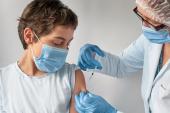Questions Raised About Study Linking mRNA Vaccines to Increased ACS Risk
An “expression of concern” has been attached to the abstract, which made the rounds on social media among vaccine skeptics.

Helped along by a media appearance by controversial British cardiologist Aseem Malhotra, MD, an abstract presented as an ePoster at the virtual American Heart Association (AHA) 2021 Scientific Sessions last month has been embraced by some as evidence that the mRNA COVID-19 vaccines increase the risk of developing ACS over the next 5 years.
But those findings, based on a little-used blood test that one cardiologist characterized as “not evidence-based,” have been swiftly called into question.
Circulation has published an “expression of concern” that cites multiple deficiencies in the abstract. A spokesperson for the meeting also clarified that abstracts are not reviewed for accuracy and the meeting takes no responsibility for their content; the AHA is now reviewing its abstract submission process.
The notice now attached to the abstract lists numerous concerns. “Specifically, there are several typographical errors, there is no data in the abstract regarding myocardial T-cell infiltration, there are no statistical analyses for significance provided, and the author is not clear that only anecdotal data was used,” it reads. “We are publishing this Expression of Concern until a suitable correction is published to indicate that the abstract in its current version may not be reliable.”
The lone author of the study, Steven R. Gundry, MD (International Heart & Lung Institute, Palm Springs, CA), has been given a deadline of 6 PM ET today to provide a correction, which will then be reviewed before publication, according to an AHA spokesperson. The expression of concern, which was issued by Manesh Patel, MD (Duke University, Durham, NC), chair of the AHA Scientific Sessions program committee, will remain in place until the correction is accepted and published. “The researcher has been in communication with us throughout this process; an updated abstract is expected by the deadline,” the AHA spokesperson said.
Gundry, who did not respond to multiple requests for comment, trained and worked as a cardiothoracic surgeon before going into private practice. He has two websites, DrGundry.com and GundryMD.com, with the latter created “to help dramatically improve human health, happiness, and longevity through my unique vision of diet and nutrition.” Through the sites, visitors will find blog posts and podcasts and can also purchase dietary supplements, foods, and Gundry’s books, among other items.
The abstract in question, published November 8 in Circulation and presented at the AHA meeting, carries an alarming title: “mRNA COVID Vaccines Dramatically Increase Endothelial Inflammatory Markers and ACS Risk as Measured by the PULS Cardiac Test: a Warning.” The PULS Cardiac Test (GD Biosciences) uses levels of nine biomarkers to estimate the 5-year risk of developing ACS. There’s some evidence that use of the test predicts acute coronary events in intermediate-risk patients and may influence treatment decisions, but a PubMed search indicates that it has not been extensively studied and it’s unclear how commonly PULS is used in practice.
As Gundry reports in the study, his group has been using the test routinely in their preventive cardiology practice—measuring it every 3 to 6 months—over the past several years. After the mRNA vaccines started rolling out, they observed “dramatic changes in the PULS score,” with increases in three biomarkers in particular 2 to 10 weeks after the second dose—interleukin-16, soluble Fas, and hepatocyte growth factor. Those changes, Gundry reports, resulted in an increase in the estimated 5-year risk of ACS from 11% to 25%.
“We conclude that the mRNA [vaccines] dramatically increase inflammation on the endothelium and T-cell infiltration of cardiac muscle and may account for the observations of increased thrombosis, cardiomyopathy, and other vascular events following vaccination,” the abstract says. “Because of these findings, we have recommended low-dose aspirin and/or quercetin for 2 weeks postinjection.”
The abstract has already been cited in the medical literature and the results picked up by antivaccine websites. The Malhotra interview aired on the fledgling television channel GB News, which launched earlier this year in the UK with the aim of offering a US cable network-style mix of news coverage and opinion-based content, pitched as a right-leaning alternative to mainstream British television.
There are many problems with the study, however, according to Mohammad Madjid, MD (University of California, Los Angeles), who commented for TCTMD. First, there is a lack of detail on patient characteristics and why the PULS test was being used. “As far as I know, there is no shred of evidence that doing this test every 3 or 6 months for years changes anything,” Madjid said, adding that doing so could lead to unnecessary testing. “It’s not evidence-based medicine that they’re practicing right now.”
Second, changes in only three of the nine biomarkers included in the test were reported in the abstract, with no indication that statistical measures were taken to account for multiple testing, Madjid said. And for the biomarkers that were reported, there were large margins of error and it’s not clear whether the changes were statistically significant.
And finally, the author’s conclusion linking mRNA vaccination to T-cell infiltration into the myocytes is not supported by the presented data, Madjid said. “We need a lot more clinical data for it,” he said. “The conclusion is very strongly worded with no real clinical evidence.”
Important to keep in mind, he pointed out, is that vaccination is known to be associated with increased inflammation based on research of flu shots. But multiple clinical trials have not supported an increased ACS risk with vaccination—on the contrary, studies have shown that the annual flu shot reduces risks of MI and ACS, Madjid said.
“We know that there is some increased inflammation. That’s how the body works, that’s how the immune system works. But does it mean it increases adverse events? It’s really too premature . . . to jump into that conclusion,” he said, adding also that there’s no evidence to support the recommendation to give low-dose aspirin and quercetin, a dietary supplement, to prevent vaccine-related adverse events.
Madjid stressed that recommendations from bodies like the US Centers for Disease Control and Prevention, the AHA, and the American College of Cardiology, who all support COVID-19 vaccination, should be heeded. “Follow the hard peer-reviewed data. That’s the only way to build the trust,” he said, expressing disappointment that this abstract was published by the AHA.
The AHA spokesperson detailed the process for publishing abstracts, noting that they “are considered preliminary research and represent the beginning of a scientific conversation on the findings, which may then, ultimately, result in a full manuscript published in a peer-reviewed scientific journal. . . . The Association makes no representation or guarantee as to their accuracy or reliability.”
She said, too, that “the standard of practice for developing abstract programming for any scientific meeting is one intended to prompt scientific discourse, not to evaluate scientific validity.”
Nonetheless, the spokesperson said, “the Association is currently reviewing its existing abstract submission processes in its ongoing effort to ensure a robust, inclusive scientific exchange focused on novel ideas to improve patient outcomes and ultimately end heart disease and stroke.”
Todd Neale is the Associate News Editor for TCTMD and a Senior Medical Journalist. He got his start in journalism at …
Read Full BioSources
Gundry SR. mRNA COVID vaccines dramatically increase endothelial inflammatory markers and ACS risk as measured by the PULS cardiac test: a warning. Presented at: AHA 2021. November 13, 2021.
Disclosures
- Gundry reports serving on the speakers bureau for Vibrant Wellness.





Comments